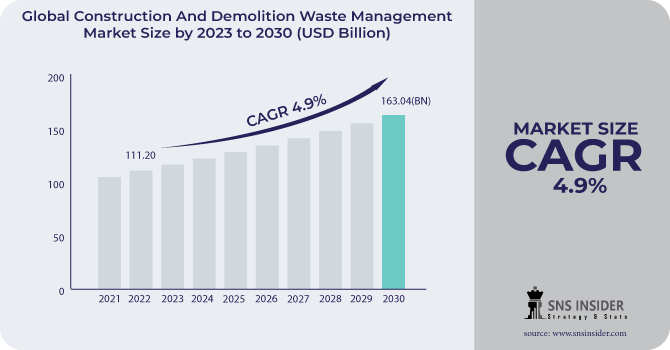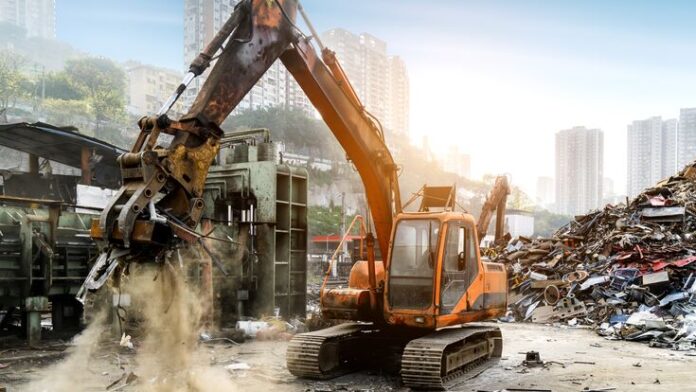Market Scope & Overview:
The research report ranks Construction and Demolition Waste Management market participants based on their corporate strategy, development, acquisitions and mergers, current developments, joint ventures, partnerships, SWOT analysis, and essential banking data. It also considers their business overview, product offering, market share, regional representation, and corporate strategy. The research report can be used by businesses to create expansion strategies that work and to gain a deeper understanding of the market.
The research report comprises estimates that have been assessed by taking into account the influence of several governmental, economic, social, technological, and legal concerns. It is based on detailed secondary research, research methodology, and internal databases of the worldwide market. The research evaluates the existing situation, which is anticipated to have an effect on the future potential of the Construction and Demolition Waste Management market.
Market Segmentation Analysis:
To aid readers in understanding the market, it was divided into categories and sub-segments in the report. The Construction and Demolition Waste Management market’s size was ascertained using both primary and secondary sources of information. The review of the plan looks at both newcomers and established industry competitors’ future growth strategies, as well as marketing channels and market positioning.
Gain Access to the Full Report @ https://www.snsinsider.com/reports/construction-and-demolition-waste-management-market-4083

Key Market Segmentation:
By Source:
-Residential
-Commercial
-Industrial
-Municipal
By Type:
-Soil, Sand & Gravel
-Concrete
-Bricks & Masonry
-Wood
-Metal
-Others
Covid-19 Impact Analysis:
The supply chain, import and export restrictions, regional government regulations, and the sector’s possible effects in light of the global COVID-19 pandemic are all covered in the market research report on Construction and Demolition Waste Management. The study in the report examines the COVID-19 pandemic and how it has impacted the expansion and development of the sector.
Key Players:
The major Key players are Daiseki Co., Ltd. (Japan), FCC Environment Limited (U.K.), Veolia Environnement S.A. (France), Waste Connections (U.S.), Clean Harbors, Inc. (U.S.), Remondis (Germany), WM Intellectual Property Holdings, L.L.C. (U.S.), Kiverco (Northern Ireland), Windsor Waste (U.K.), Republic Services (U.S.), Casella Waste Systems, Inc., Renewi plc (U.K.) and others.
Regional Outlook:
In-depth multi-level research was conducted on a wide range of global geographic markets in order to collect qualitative and quantitative market information from internal and external sources. For each Construction and Demolition Waste Management market area, the plan also include creating a regional market analysis and forecast.
Competitive Analysis:
The qualitative and quantitative industrial elements are the two sections of the report. The competitive environment, large business product offers, and stakeholder investment opportunities in the micro market will all be carefully examined in the market study. The Construction and Demolition Waste Management market analysis analyses market sizes for particular industries and nations in order to forecast market numbers for the upcoming year.
Key Questions Answered in the Construction and Demolition Waste Management Market Report:
-What are the market’s main growth prospects for the foreseeable future?
-What are the best strategies for maintaining industry competition?
-What are the target market’s dimensions and potential future growth?
Key Drivers:
1. Regulatory Compliance: Stringent regulations and policies mandating proper waste management and recycling practices drive the demand for waste management services and solutions.
2. Urbanization and Infrastructure Development: Rapid urbanization, coupled with infrastructure development projects, increases the volume of construction and demolition waste, necessitating efficient waste management strategies.
3. Environmental Awareness: Growing environmental consciousness among governments, businesses, and consumers fuels the adoption of sustainable waste management practices, including waste reduction, recycling, and reuse.
4. Cost Reduction: Effective waste management helps reduce disposal costs and may generate revenue through the recovery of valuable materials, incentivizing businesses to invest in waste management solutions.
5. Resource Scarcity: Depletion of natural resources and raw materials necessitates the recovery and recycling of construction and demolition waste to meet material demands sustainably.
6. Corporate Social Responsibility (CSR): Companies increasingly prioritize CSR initiatives, including sustainable waste management, to enhance their environmental credentials and meet stakeholder expectations.
7. Technological Advancements: Innovations in waste sorting, recycling technologies, and material recovery processes improve the efficiency and effectiveness of construction and demolition waste management.
Conclusion:
The development of strategies to get a competitive edge in the global market and the identification of significant market opportunities will be aided by Construction and Demolition Waste Management market research for industry participants. The market encompasses a wide range of waste types, including soil, sand & gravel, concrete, bricks & masonry, wood, metal, and others, originating from various sources such as residential, commercial, industrial, and municipal sectors.
The Construction and Demolition Waste Management Market presents a critical opportunity for sustainable resource management and environmental conservation. With increasing urbanization and industrialization worldwide, the volume of construction and demolition waste continues to rise, necessitating effective waste management solutions.
Contact Us:
Akash Anand – Head of Business Development & Strategy
Phone: +1-415-230-0044 (US) | +91-7798602273 (IND)
Related Reports:
